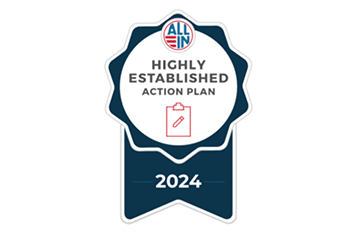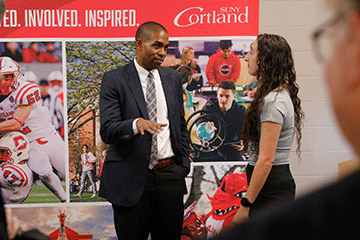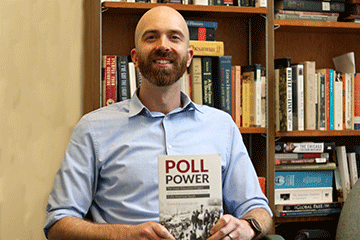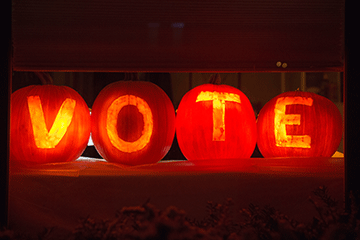
04/16/2024
SUNY Cortland is one of only 93 institutions of higher education in the United States recognized this year for action plans promoting student participation in elections by one of the largest organizations in the U.S. promoting college students’ participation in the democratic process.
For the second time, ALL IN Campus Democracy Challenge, a national, nonpartisan program promoting college voter registration and turnout efforts awarded SUNY Cortland a Highly Established Action Plan Seal. The university first won the honor in 2022.

This year, the Challenge considered 932 action plan participants, each of which submitted a detailed outline of how it will reach its voter registration and turnout goals. Only two other SUNY institutions made the 2024 “highly established action plan” list.
“The seal represents a lot of teamwork, a lot of coordination, a lot of input,” said John Suarez, director of the university’s Institute for Civic Engagement. “It really is an all-hands-on-deck effort to do three things: voter registration, getting out the vote and voter education.”
Housed in SUNY Cortland’s Division of Academic Affairs, the Institute for Civic Engagement serves as a resource for students, faculty, staff and many community partners by promoting the development of mutually beneficial opportunities through applied, or experiential, learning.
Cortland’s 28-page action plan includes voter registration, voter turnout and myriad voter education activities ranging from presentations to debates to deliberative dialogues. A recent one on April 3, titled “Free Speech and the Inclusive Campus,” included students from two student organizations, BridgeCortland and Turning Point USA, as well as faculty, staff and a Cortland County legislator.
Such dialogues are important, according to Suarez, because they help participants practice discussing divisive issues in informed, civil and productive ways.
“Voter registration is great, getting out the vote is great, but to have students motivated to get out to register to vote and then vote, to motivate students to participate in civic engagement between elections, we have to have students who know what’s going on,” Suarez said.

The ALL IN Challenge doesn’t support or oppose candidates for public office or take a stand for or against any political party.
“More than anything else, students need to know how to listen with an open mind,” Suarez said. “It means critical thinking to test the accuracy and validity of what someone is saying, but especially to be a critical thinker and listener to someone who agrees with you, because your defenses are down.”
The national Challenge was launched in 2012 when just 39% of young adults ages 18 to 29 and 47% of college students voted in the presidential election. The National Task Force on Civic Learning and Democratic Engagement had called on the U.S. to reclaim higher education’s civic mission.
SUNY Cortland’s voting rate for eligible students was only 6.3% in 2014.
The university joined the challenge in 2016. Afterward, Cortland raised its voter registration and voting rates to 77% and 24% in 2018 and 85% and 69% in 2020, respectively. Looking forward, student interns and volunteers registered 767 new voters in Fall 2022 and 777 new voters in Fall 2023, according to Marissa Pappas, project coordinator of the New York Public Interest Research Group at Cortland.
Now, according to Suarez, SUNY Cortland is working to attain the highest voter registration and election turn-out rates possible by November 2024, 90% if possible.
“We’ve seen a lot more students registering to vote using their SUNY Cortland address,” Pappas noted. “Also, there’s an uptick in them registering to vote by mail. We’re definitely getting students registered to vote a lot earlier.
Pappas in four years has seen volunteer internships increase from about six students to more than 30 as NYPIRG tackles its nonpartisan issues of democracy, higher education, hunger and homelessness, environmental protection, public health and consumer protection.
“It seems like more and more students are interested in getting away from the partisan thing and getting more down to the issues,” Pappas said.
Building on the last action plan, the institute worked to convince faculty to design nonpartisan ways of incorporating discipline-based explorations of current issues as well as concepts regarding citizenship into course syllabi, Suarez noted.
Faculty in the departments of Childhood/Early Childhood Education, English, Physics, and Recreation, Parks and Leisure Studies, Health, and Student Success (academic affairs) have undergone this very time consuming and intensive process, which the university rewarded with a stipend provided by Barbara A. Galpin ’68. Institutional Equity and Inclusion wholeheartedly joined the effort unprompted.
“If I’m a physicist, I can use my skills to be able to research, to know where to find information, to access that information, to be able to turn that information into messages persons on the street can understand,” Suarez said as an example of the effort to infuse civic responsibility into diverse disciplines.

“President Bitterbaum and members of his leadership team have strongly supported the Cortland Votes effort, which works with community partners to establish a culture of voting on campus,” Suarez said. “In Fall 2023, Cortland Votes evolved into the Dragons for Democracy project, which works to help students understand that partnering with government is as important in addressing issues as partnering with not-for-profit agencies.”
SUNY Cortland currently holds the prestigious community engagement elective classification from the Carnegie Foundation for the Advancement of Teaching through 2025 as both the first institution in the State University of New York system to capture this milestone in 2008 as well as the first one to hold the reclassification distinction.